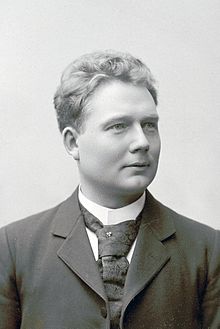Hermann Brag
Hermann Brag , also Herman Brag ( April 1, 1860 in Kalmar , Kingdom of Sweden - January 3, 1936 in Stockholm ) was a Swedish opera singer ( bass ).
Life
Brag, the son of a master builder, first moved to the university in Uppsala for the purpose of natural history studies, but soon he decided to follow his inclination and to devote himself entirely to the singing profession. After taking lessons from Professor Ivar Eggert Hedenblad , he sang a rehearsal at the Stockholm Opera and was to be hired.
However, he preferred to train himself artistically in Germany and went to Julius Stockhausen in Frankfurt am Main in 1886 , whereupon he began his stage career as a member of a small German troupe.
He also went to Italy to see Professor Francesco Lamperti and in 1891 joined the royal association. Theater in Stockholm, where he made his debut as "Plumkett". For seven years he worked there with great luck in the bass game. In 1898 he took part in a vocal tour that Swedish students took to Germany, and in Dresden his solo “Braver Mann” by Mendelssohn caused such a stir that he was prompted to devote his artistic activities to the Dresden Opera. He appeared as "Falstaff" on the court stage and was immediately engaged for the same. Brag (1898) began his engagement as “van Bett” and has been one of the deserving singers on this stage ever since.
Not only was his voice and its good training generally recognized, but his excellently dry, effective comedy was also widely praised. He was referred to as the "born bass buffo". The artist had an extensive repertoire, he sang his first play and bass buffo parts, all with equal success. Particularly noteworthy are: "Baculus", "Bartolo", "Plumkett", "Dulcamara", "Sulpice", "Lord" in Fra Diavolo etc.
His life after 1902 is unknown.
literature
- Ludwig Eisenberg : Hermann Brag . In: Large biographical lexicon of the German stage in the XIX. Century. Paul List, Leipzig 1903, p. 117 ( daten.digitale-sammlungen.de ).
- Brag, Hermann. In: Karl-Josef Kutsch , Leo Riemens : Large singer lexicon . Volume 4. de Gruyter, Berlin 2004, ISBN 3-598-44088-X , p. 555.
Web links
- Hermann Brag at Operissimo on the basis of the Great Singer Lexicon
| personal data | |
|---|---|
| SURNAME | Brag, Hermann |
| ALTERNATIVE NAMES | Brag, Herman |
| BRIEF DESCRIPTION | Swedish opera singer (bass) |
| DATE OF BIRTH | April 1, 1860 |
| PLACE OF BIRTH | Kalmar , Kingdom of Sweden |
| DATE OF DEATH | January 3, 1936 |
| Place of death | Stockholm |

